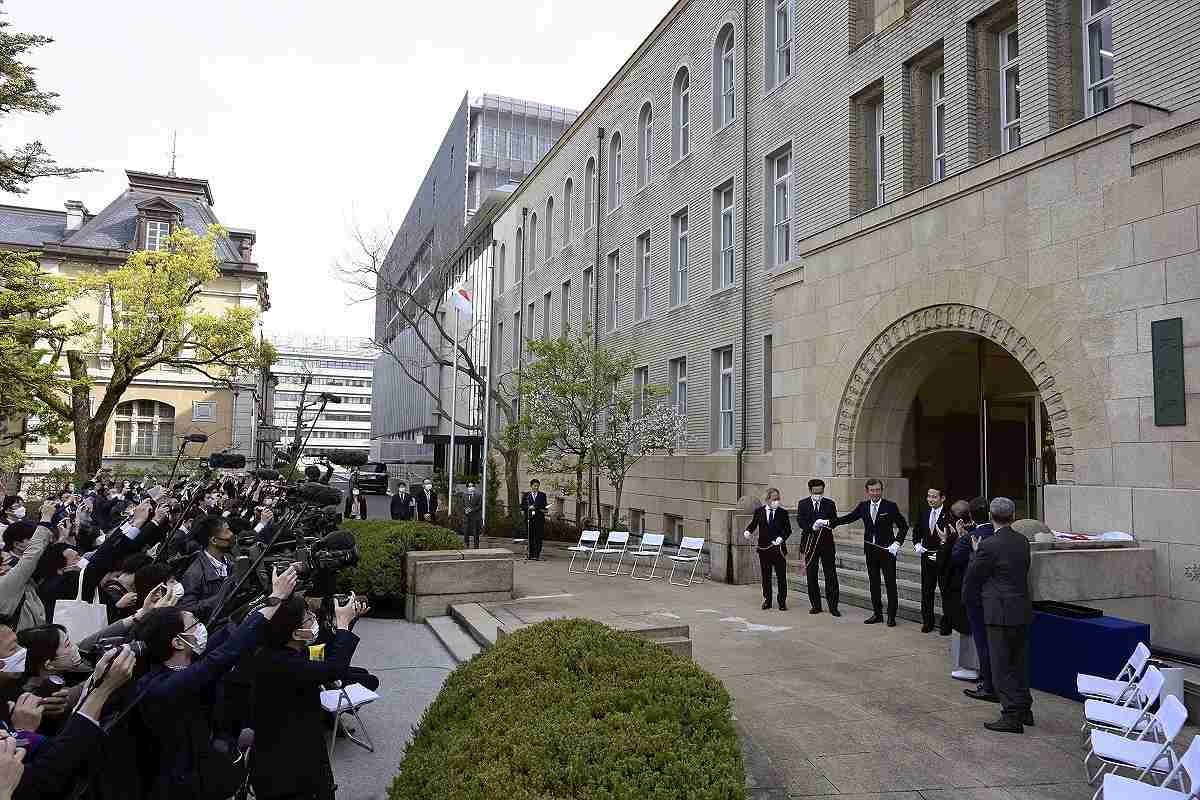
The new building of the Cultural Affairs Agency in Kamigyo Ward, Kyoto
21:00 JST, March 28, 2023
KYOTO — Monday’s relocation of the Cultural Affairs Agency to Kyoto from Tokyo was the first time since the Meiji era (1868-1912) that a central government office has been relocated to outside Tokyo.
The move is intended to strengthen the agency’s functions as a control tower for administering cultural affairs. It is also the realization of a major regional revitalization measures promoted by the administration of former Prime Minister Shinzo Abe in 2014.
“The ancient capital of Japan has a strong brand for disseminating [cultural] information to the world,” agency Commissioner Shunichi Tokura said on Monday, emphasizing the significance of the relocation, after a ceremony to unveil the agency’s nameplate in Kyoto’s Kamigyo Ward.
The Kansai region is home to 50% of officially designated national treasures and 40% of important cultural properties. Traditions such as tea ceremony and flower arranging have especially deep roots in Kyoto, where there are many shrines and temples, including UNESCO World Heritage sites Kiyomizudera temple and Shimogamo Shrine. The city’s calendar is filled with traditional events such as the Gion Festival.
By relocating its base to such a center of traditional culture, the agency is expected to have greater appeal when promoting Japanese culture. It will also provide greater opportunities for agency employees to interact with practitioners of traditional culture and to develop measures for the protection and promotion of that culture.
Kyoto Prefecture and Kyoto City intend to promote themselves as a “cultural capital” to promote tourism and attract international conferences. They will regularly exchange opinions with the agency to consider jointly holding events and creating new businesses related to culture and the arts. “We hope to create a new trend in cultural policies in Kyoto,” Kyoto Gov. Takatoshi Nishiwaki said.
Repair center
The agency’s primary missions are the protection of cultural properties and the promotion of culture and the arts. The relocation is expected to provide an opportunity to strengthen these functions.
A national center for the repair of cultural properties will be established in Kyoto by fiscal 2030 to enhance such restoration work as a part of the government’s Takumi Project for Cultural Properties, an initiative that aims to strengthen the system to repair cultural properties. The center will consolidate information on restoration projects around the nation. In an integrated manner, it will share know-how, secure raw materials and train technicians.
In recent years, the agency has been placing emphasis on “culture that earns money” and has been encouraging the development of entertainment and art as export industries.
In the past three years, however, cultural and artistic events have been canceled or scaled back in Japan and abroad because of the pandemic, and opportunities to market Japanese culture have been lost. With an eye on the 2025 Osaka-Kansai Expo, which is expected to attract many tourists from abroad, the agency will work to regain lost ground.
Frequent business trips to Tokyo
About 390 agency employees, or 70% of its total of 590 staffers, are set to work in Kyoto. Whether the relocation will cause disruptions to their work is a major question.
In fiscal 2020, the agency conducted a simulation in which employees were assigned to work in Kyoto in shifts. It found they would have to make frequent business trips to Tokyo. It also was found that 25.6% of work normally performed in person could be handled remotely. Only 12.2% of work related to briefing Diet members could be carried out remotely.
There is an urgent need to create a system that allows agency operations to be done online, including cooperation with the Diet and other ministries and agencies.
The agency’s initial budget for fiscal 2022 is ¥107.6 billion, which is less than the annual budget of a single university such as the University of Tokyo. Cultural expenditures accounted for 0.11% of the national budget in 2021, a noticeably lower level than those of South Korea at 1.23% and France at 0.79%. How to make the most of the limited budget will determine the success or failure of the policies.
Kazuo Fujino, professor emeritus of cultural policy at Kobe University, said that relocating a national government office to a local region can offer opportunities for local perspectives to be reflected in national policy. “Although the agency does not have a large budget, it is hoped that it will cooperate with other ministries and agencies to protect and nurture cultural diversity,” Fujino said.
Top Articles in Politics
-

Japan PM Takaichi’s Cabinet Resigns en Masse
-

Sanae Takaichi Elected Prime Minister of Japan; Keeps All Cabinet Appointees from Previous Term
-

Japan’s Govt to Submit Road Map for Growth Strategy in March, PM Takaichi to Announce in Upcoming Policy Speech
-

LDP Wins Historic Landslide Victory
-

LDP Wins Landslide Victory, Secures Single-party Majority; Ruling Coalition with JIP Poised to Secure Over 300 seats (UPDATE 1)
JN ACCESS RANKING
-

Producer Behind Pop Group XG Arrested for Cocaine Possession
-

Japan PM Takaichi’s Cabinet Resigns en Masse
-

Japan Institute to Use Domestic Commercial Optical Lattice Clock to Set Japan Standard Time
-

Man Infected with Measles Reportedly Dined at Restaurant in Tokyo Station
-

Israeli Ambassador to Japan Speaks about Japan’s Role in the Reconstruction of Gaza





















